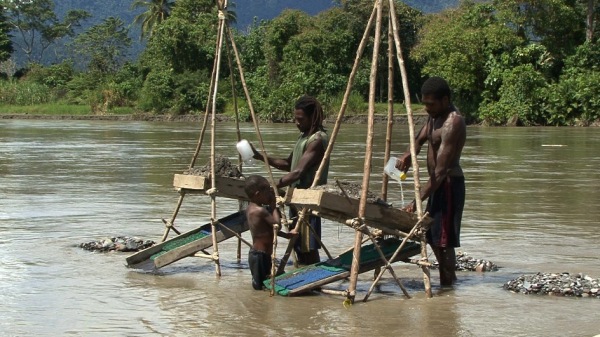
Logo at French oil and gas company Total gas station in Marseille. REUTERS/Jean-Paul Pelissier
PNG Blogs | April 29, 2019
The Member for Moresby North-West, Sir Mekere Morauta, today questioned the legitimacy of the Gas Agreement the O’Neill Government has signed with the Papua LNG partners, saying the Prime Minister and his cronies have hijacked the approval process and put State and landowner interests at risk.
“I have seen evidence from a variety of sources that suggests we are heading for a repeat of the PNG LNG model which has brought few benefits to the state and landowners,” he said. “Peter O’Neill has shut out the State Negotiating Team and gone with a Gas Agreement that is largely the work of Total, ExxonMobil and Oil Search.
“The Department of Petroleum and other Papua New Guinean experts have been sidelined in favour of shadowy participants in the O’Neill Government’s corruption, waste and mismanagement. Why?”
Mr O’Neill’s interference in due process opens PNG to another financial disaster, as it did with PNG LNG and the UBS-Oil Search loan, Sir Mekere said. It risks resource owners not being paid their royalties and development levies, as has happened with PNG LNG. Mr O’Neill has still not provided answers as to where he has secreted the money, whether it is still there, and when resource owners will be paid.
It means that once again foreign resource giants have been granted huge financial and tax concessions that will cost the nation billions of kina in lost revenue. Mr O’Neill’s mismanagement of PNG LNG means the operation is still paying virtually no tax.
It means that questions remain about the actual technical and financial viability of the project. “Will it become another financial and social burden on ordinary Papua New Guineans that PNG LNG has become because of Mr O’Neill,” Sir Mekere asked
“Mr O’Neill and Total and its partners have many questions to answer. For now, I want to know why the State Negotiating Team and the Department of Petroleum have been sidelined. Who is advising Mr O’Neill?
“A potentially expensive and dangerous failure of due process has resulted from Mr O’Neill and his cronies taking over the negotiations. These failures are outlined in a letter to the Chief Secretary from the Department of Petroleum immediately before the Gas Agreement was initialed by Mr O’Neill and then signed by the participants.”
Acting Secretary Lohial Nuau wrote on March 27 that at least 11 critical documents have not been provided by Total which are required before any commercial and financial terms can be agreed to, nor has the Department received the required Application for a Petroleum Development Licence.
“The APDL, as per the Oil and Gas Act 1998, will require supporting technical documentation that will give confidence to the Department of Petroleum of proven gas and oil reserves, investment cost, project schedule and environmental compliance,” he wrote. “These are key parameters in the economic model and therefore form the basis for the commercial and fiscal negotiations.
“The department has received and reviewed from Total preliminary documents … for the purpose of discussing the APDL application process. These documents have shown little progress on the Papua LNG project and are NOT at the level of technical detail that the Department requires in order to make a decision on an APDL. In addition in the letter from Total of February 8, Total committed to an APDL application on March 15, 2019. Until today the Department has not received such application.
“Based on the fact that none of the required documents have been submitted and the Department of Petroleum has no ability to verify any of the important economic parameters provided by Total in the economic analysis, I come to the following recommendations to the SNT:
1. Because no Application for an APDL and associated licenses have been submitted. On January 29 2019, I requested Total, as required by the Oil and Gas Act 1998, to apply for these permits and provide the Department of Petroleum with the supporting documentation urgently.
2. As the Department of Petroleum has not received the application for the APDL including any of the Technical documentation required by the Oil and Gas Act 1998, the Department cannot review and endorse any of the key economic parameters provided by Total in their economic model. Therefore the Department recommends for Total to urgently submit the APDL and all supporting documents before input can be provided to the Gas Agreement.
3. Social Mapping and Landowner Identification process still has to be completed. Therefore there is no proper due diligence by the stakeholders on the Gas Agreement. The Department recommends for Total to urgently complete the SMLIS. “
Sir Mekere said: “These are damning comments from the department. They are supported by evidence from other experts who have been following Papua LNG progress, and are alarmed at the multi-billion-kina risks that Mr O’Neill has exposed the nation to.
“I am also concerned about reports of visits to China by O’Neill officials in the company of Total executives. I am surprised at Total’s willingness to associate itself so closely with Mr O’Neill and his cronies. I would hate to hear any suggestion of a special sale of an interest in Papua LNG.
“A new Government must review the agreements personally entered into by Peter O’Neill to make sure that the State, the landowners and the developers share the risks and the benefits fairly,” Sir Mekere said.










